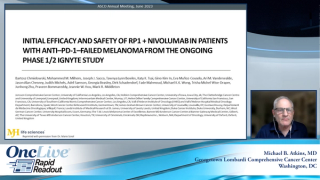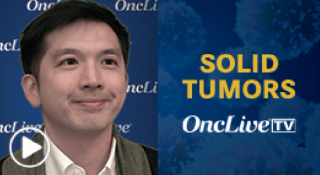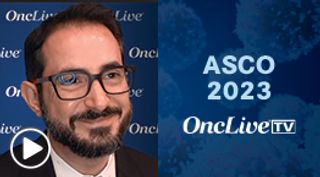
Melanoma & Skin Cancer
Latest News

Neoadjuvant treatment with intratumoral daromun led to a statistically significant and clinically meaningful improvement in recurrence-free survival compared with surgery alone in patients with locally advanced, fully resectable melanoma, meeting the primary end point of the phase 3 PIVOTAL trial.

FDA Approves Adjuvant Nivolumab for Completely Resected Stage IIB/C Melanoma

FDA Extends Priority Review of BLA for Lifileucel in Advanced Melanoma
Latest Videos

CME Content
More News

Nicholas Coupe, MBBS, PhD, discusses the rationale for investigating IMM60 with pembrolizumab in patients with advanced melanoma or metastatic non-small cell lung cancer, as well as key background information that led to this investigation.
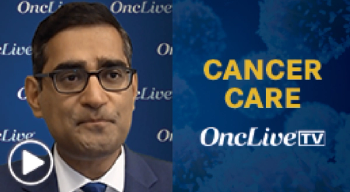
Varun Monga, MD, discusses the background for investigating the protein arginine methyltransferase 5 brain-penetrant inhibitor PRT811 in a phase 1 study in patients with recurrent high-grade glioma or uveal melanoma, as well as the agent’s mechanism of action.

The European Commission has approved single-agent nivolumab for use in the adjuvant treatment of adult and adolescent patients aged 12 years or older who have stage IIB or IIC melanoma and who have undergone complete resection.

Jason Luke, MD, FACP, discusses the background of the phase 3 KEYNOTE-716 trial of pembrolizumab vs placebo as adjuvant therapy in patients with stage IIB or IIC melanoma, highlighting previous data from the trial that led to the 36-month follow-up report.

Inderjit Mehmi, MD, discusses results from a subgroup analysis of patients with advanced melanoma and poor-risk features given fianlimab and cemiplimab in a phase 1 trial.

Pembrolizumab demonstrated long-term survival benefit compared with ipilimumab in patients with unresectable stage III/IV melanoma who received up to 1 prior systemic therapy.

The natural killer T-cell agonist IMM60 may overcome resistance to PD-1 inhibitors when combined with immunotherapy in patients with melanoma and non–small cell lung cancer.

Zeynep Eroglu, MD, explains the rationale for adding navitoclax to dabrafenib plus trametinib in the treatment of patients with BRAF V600–mutant metastatic melanoma, highlights the methodologies and results of the CTEP-P9466 trial, and describes the implications of this research for this patient population.

The FDA has approved HEPZATO KIT (melphalan/Hepatic Delivery System) for use in the treatment of select patients with unresectable hepatic-dominant metastatic uveal melanoma.

The novel personalized cancer vaccine IFx-Hu2.0 was found to be safe and well tolerated with weekly dosing in patients with checkpoint inhibitor–resistant cutaneous squamous cell carcinoma and Merkel cell carcinoma, according to data from an ongoing phase 1b trial.

Treatment with the long-acting interleukin-2 superkine led to durable tumor control and no dose-limiting toxicities in patients with advanced solid tumors, according to data from the dose-escalation portion of the phase 1/2 ABILITY-1 trial.
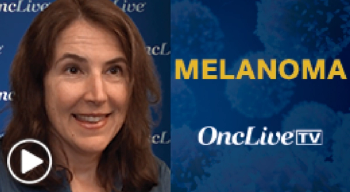
Elizabeth Buchbinder, MD, discusses the rationale for investigating nivolumab maintenance therapy in patients with melanoma who experienced severe immune-related adverse effects due to combination therapy with nivolumab and ipilimumab, and details the findings of this investigation.

Long-term data demonstrated that treatment with cosibelimab improved complete response rates over time in patients with locally advanced or metastatic cutaneous squamous cell carcinoma in a phase 1 trial.

Sarah Weiss, MD, discusses the ongoing phase 2/3 TEBE-AM trial of tebentafusp with or without pembrolizumab in a subset of pretreated patients with non-uveal melanoma.

The combination of mRNA-4157 and pembrolizumab will be further evaluated as an adjuvant treatment option for patients with resected, high-risk, stage IIB to IV melanoma in the phase 3 V940-001 trial.

Omid Hamid, MD, discusses the key efficacy and safety findings for the combination of fianlimab plus cemiplimab in patients with advanced melanoma.

Ryan J. Sullivan, MD, discusses the early reduction of circulating tumor DNA in patients with metastatic uveal melanoma treated with tebentafusp and shares how these reductions could correlate with longer overall survival in patients with a best response of stable disease.

The European Medicines Agency’s Committee for Medicinal Products for Human Use has recommended approval of nivolumab monotherapy for the adjuvant treatment of patients at least 12 years of age with completely resected stage IIB or IIC melanoma.

Jason Luke, MD, FACP, discusses key takeaways from the KEYNOTE-716 and KEYNOTE-942 trials and other key updates from across the melanoma landscape presented at the 2023 ASCO Annual Meeting.
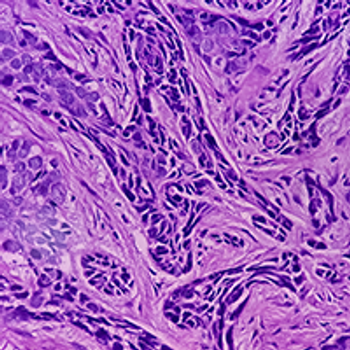
The DecisionDx-Melanoma 31-gene expression profile test displayed the capability to stratify patients with cutaneous melanoma by risk of death from the disease and receival of the 31-GEP test may result in a survival benefit compared with untested patients.
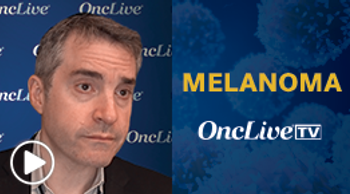
Brian Gastman, MD, discusses results from a biomarkers analysis of patients with stage IIB/C melanoma in the phase 3 CheckMate76K trial.

Varun Monga, MBBS, discusses the mechanism of action of PRT811, key efficacy and safety findings from a phase 1 trial investigating the agent, and potential future directions with this agent in uveal melanoma and IDH-mutant high-grade glioma.

Danielle K. DePalo, MD, discusses findings from a study comparing first-line isolated limb infusion/perfusion vs immune checkpoint inhibitors and intratumoral therapy in patients with surgically unresectable melanoma in-transit metastases.

Pembrolizumab led to sustained improvements in recurrence-free survival and distant metastasis–free survival vs placebo as adjuvant therapy in patients with resected stage IIB or IIC melanoma

Although the highly potent, selective, allosteric, oral, small molecule BRG1/BRM inhibitor FHD-286 elicited signs of clinical activity and safety as monotherapy in patients with metastatic uveal melanoma in the dose-escalation portion of a phase 1 trial, further development in this indication will not be pursued.




